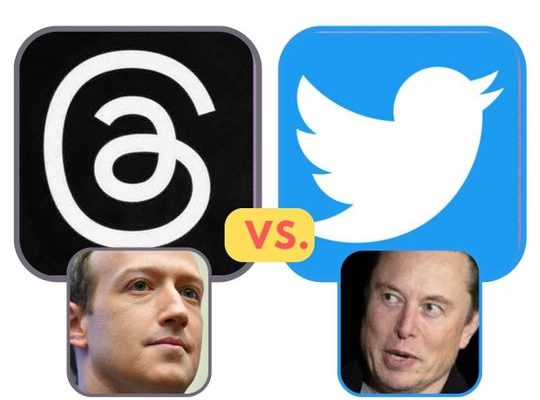By Raoul Davis
Threads vs. Twitter the ‘Social Media Showdown of the Century’

As a global CEO brand strategist at the helm of Ascendant Group Branding, ranked globally as a leader in PR and CEO branding; the rise of Threads as a fresh social media platform didn’t escape my notice. Simultaneously, witnessing Elon Musk’s tactical maneuvers on Twitter underscored the fierce competition in the social media landscape. Here are eight lessons learned and things to watch from the Threads’ launch and the ongoing Twitter versus Threads saga.
#1 Threads: Born in a Perfect Storm
Threads came into existence at a critical time marked by constant changes on Twitter and Elon Musk’s tumultuous leadership. Additionally, Mark Zuckerberg’s decision to launch Threads promptly, without ironing out potential bugs or waiting for a more streamlined signup process, bolstered its emergence. These factors collectively created a perfect storm that catapulted Threads to an explosive start with a whopping 75 million users in just four days, which has now crossed the 100 million mark.
RELATED: 7 reasons why Threads is a genuine existential threat to Twitter
#2 Inclusive Access: A Winning Strategy
Unlike its competitors Spills and BlueSky, Threads extended its platform to all, eliminating the invite-only approach. This strategic move was welcomed by a wide range of users and allowed Threads to swiftly surpass competitors who had imitated Clubhouse’s exclusivity.
#3 A More Stable Alternative
Despite Mark Zuckerberg’s past criticism, Threads’ rise has positioned him as a more predictable and preferred alternative to many for Elon Musk. This favorability has been particularly beneficial for CEO, personal, and company brands seeking a more stable platform facing less controversy. While many personal and corporate brands face backlash for advertising on Twitter. They are finding Threads presence to be seen as a net positive. This is likely to significantly influencer their social media strategy over the next 12 months.
#4 Fostering Positivity
In contrast to the negativity often associated with platforms like Twitter and Facebook, Threads has infused a refreshing positivity into social media communication. This constructive environment favors CEO and personal brands that thrive on meaningful engagement.
#5 Seamless Transition from Instagram
Threads’ user-friendly strategy of allowing Instagram users to inherit their follower base has significantly eased user transition. This strategic move has given Threads an edge in quickly establishing an active and engaged user base.
#6 Catching the Early Adopter Wave
With platforms like Instagram, Twitter, and TikTok having matured, Threads offers users a fresh chance to be early adopters and leverage the platform’s growth. This opportunity is especially appealing for brands striving to establish themselves as thought leaders and influencers.
#7 An Antidote for Facebook’s Aging User Base
As Facebook’s appeal wanes among younger users, Threads emerges as a timely alternative. Beyond Twitter’s threat, Zuckerberg’s strategic move to create a fresh platform caters to the dwindling interest from previously loyal Facebook users growing fatigued of the platform. He created a competitor that infuses fresh energy into Meta’s overall brand.
#8 Don’t Ever Count Elon Musk Out
While Threads has had a remarkable start, one can’t ignore the strategic brilliance of Elon Musk. His decision to financially reward content creators generating significant impressions is a compelling counter-move that could curb Threads’ momentum. This gesture is likely to make creators rethink their disdain for Twitter as it now provides an avenue to monetize their significant follower base. Moreover, it’s essential to note that Twitter’s traffic, once a point of worry, has stabilized and even witnessed some of its best days recently. Despite the hard blows, Musk’s rebound potential should not be underestimated.
#9 A Potential Political Divide
An interesting trend is the potential political polarization of these platforms. We’re beginning to see a divide where more ideologically left-leaning users show a preference for Threads, while those leaning towards the far right have a stronger affinity for Twitter. Meanwhile, the apolitical segment appears to participate in both platforms. How this trend will evolve and impact the social media landscape is unpredictable, but it’s a point worth observing for potential ramifications on user engagement and content
The real challenge for both platforms will be sustaining long-term user engagement and addressing issues like spam, harassment, and false claims that have previously caused user disillusionment. As the saga continues, the competition between Threads and Twitter is shaping up to be a riveting spectacle, promising exciting possibilities for users, CEOs, personal and corporate brands, and content creators.





























